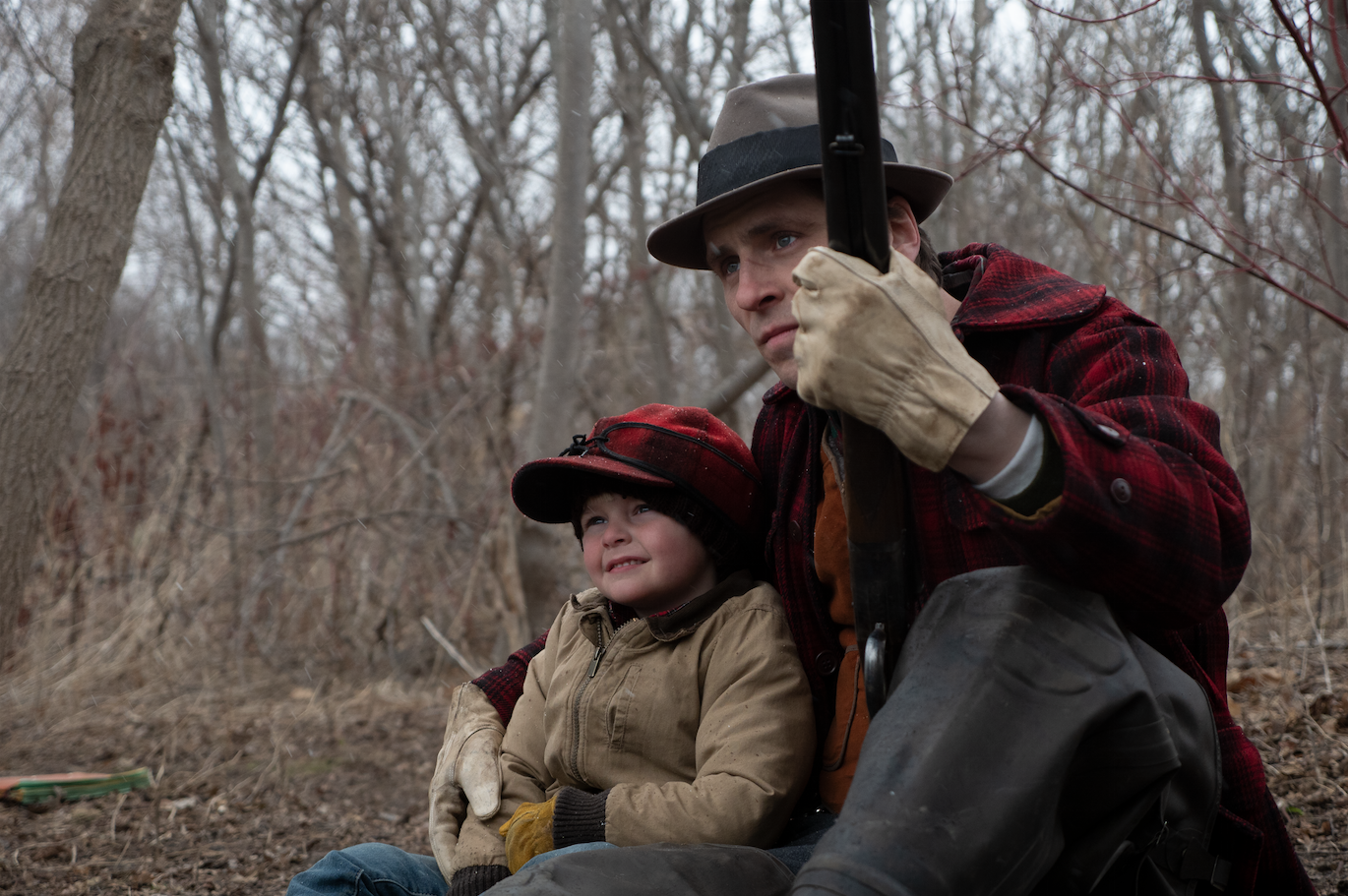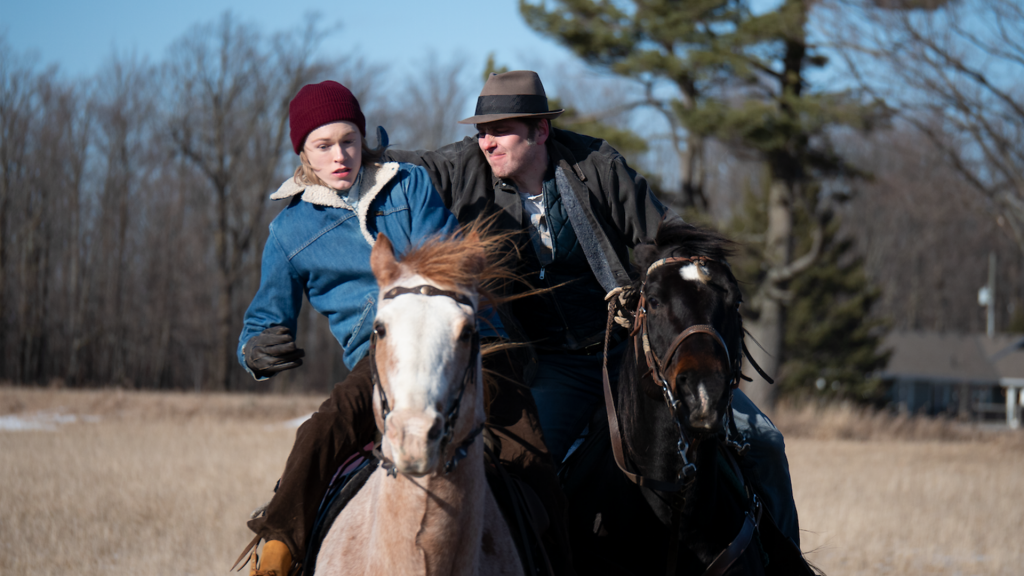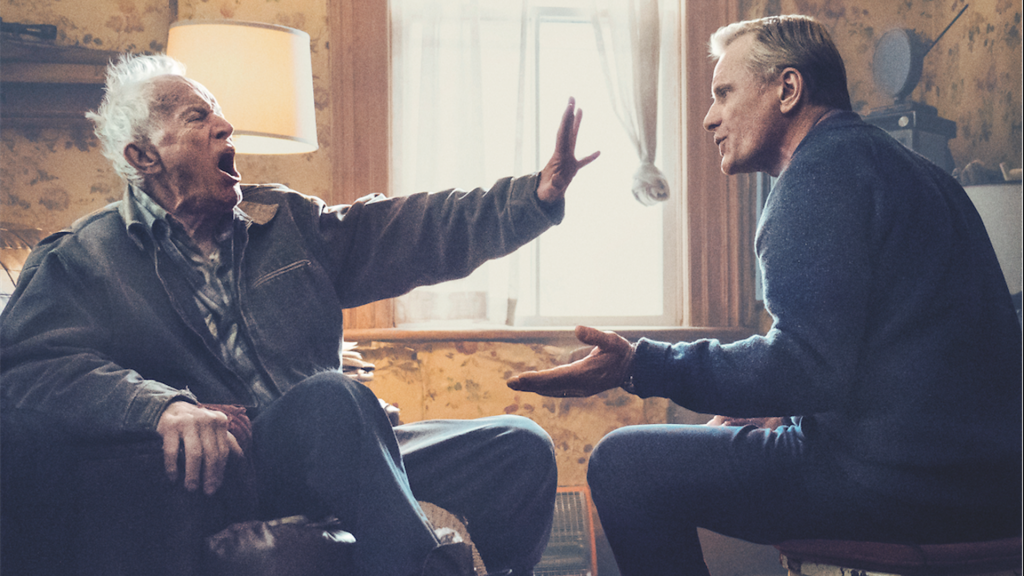
Jason Solomons finds actor Viggo Mortensen in characteristically ebullient mood in their over-running Zoom catch-up.
Although still best-known to audiences as heroic Aragorn in the Lord of the Rings films, actor Viggo Mortensen has a reputation in the business as cinema’s Renaissance Man.
He acts, writes poetry, composes music, sings, paints, runs a publishing imprint, speaks seven languages, drafts screenplays and, now, is a director. And women tend to swoon at his feet.
I’ve seen it in real life, having hosted several Q&As with him, and conducted a masterclass on stage at the London Film Festival a few years ago, when he was appearing in an Argentinian film, acting his part in Todos tenemos un plan (‘Everybody Has a Plan’), totally in Spanish.
All sorts of fans come up to him – Tolkein nerds, football supporters wanting to chat about his Argentinian team San Lorenzo (he’s always got a scarf, a jersey or a club badge somewhere about his person – even on the Oscar red carpet), poets, photographers, students with big ideas, producers with multi-lingual scripts.
Viggo’s Zen-like calm accepts it all, his pace never quickening, his voice rarely wavering, his piercingly pale eyes open, his patience unbending. It’s a remarkable presence, and flowing with time and generosity.
He can go on a bit, which is why I’m waiting for 30 minutes to now reconnect with him on Zoom to talk about his directing debut Falling.
I’m in no doubt he has over-run talking to a journalist before me and, sure enough, my own allowed time with him goes over, too – when the PR woman interrupts the Zoom to say time is up, Viggo politely tells her: “Oh don’t worry about that, we have much to speak about still, we can go on a bit…” And we do.
Which is just as well. Viggo’s answers are long stories, never dull but careful not to miss a detail. The day Peter Weir approached him for a part, his first in a movie, to be in the 1985 thriller Witness, with Harrison Ford, is a 10-minute monologue.
And when I ask about the casting, in Falling, of Icelandic actor and Borg vs McEnroe star Sverrir Gudnason to play the domineering father figure Willis as a younger man, I get a long story about how Viggo once, when travelling around Europe, snuck into the 1977 Madrid Open tennis tournament by pretending to be a Danish photo journalist to get up close to his favourite player, Bjorn Borg.
“So I’m sitting with all the photographers, almost right on the clay court,” recalls Viggo, “And Borg won against a Chilean in the final and I get right up to the player’s chairs and call him excitedly “Mr Borg, Mr Borg’ and he just looked at me to say ‘You’re not a photographer’, but I got him, ice-cold as ever, with the long hair and sipping out of a Coca-Cola cup, eyes right at me and because he had figured me out to be an imposter, he was nearly smiling, which he so rarely did. It was a cool picture, so I sent a copy to him. He sent it back, with an autograph, saying ‘Thanks, I’m happy it worked out for you’. I still have the photo.”

Falling is a beautiful film, as you’d expect from this polymath aesthete (he produced, wrote, did the score, acts, directs and probably made the tea), but it’s also very tough at times. The father, Willis, has bouts of alcoholic rage and bitter dementia that unleash unpleasantries and insults against his gay son, past marriages, any number of targets, even the grandchildren’s hair colour and nose piercings. In flashback, Willis’ moods are often portrayed as even worse.
The elderly Dad, an irascible farmer father in the film to Viggo’s own character of a gay LA Dad, is played, magnificently, by veteran character actor Lance Henriksen who’s been in more than 200 movies, many of them in what we used to fondly call the ‘straight-to-video’ era (Piranha 2, The Mangler, Mind Ripper and Sasquatch Mountain) but many are also classics such as Aliens, The Terminator, Pumpkinhead, Kathryn Bigelow’s Near Dark and Jean-Claude Van Damme’s Hard Target.
He was also in the Al Pacino thriller Dog Day Afternoon and the list of army sergeants, grizzled cowboys or mercenary leaders is impressive. But nothing is up there with this performance, which has already got many tipping him for an Oscar nomination at the age of 80.
Where did Viggo get the idea of casting this actor as his father? “I was in a Western with him, Appaloosa directed by Ed Harris, and we hung out and he was a great storyteller and good company and I just sort of filed the idea away of working with him one day again,” says Viggo. “But I didn’t know he’d be as good as this – it was braver, more profound, surprising, shocking, more complex emotionally than I ever dreamed.”
And it’s true. Henriksen is amazing in Falling, going from anger to distracted reminiscence in a heart beat, softening for a moment before snapping back into resentment and anger. Horrible at times though his character may be, you still somehow feel for him, for the pain he’s hiding, even as he’s offending most of his family at a reunion lunch, and particularly Viggo’s husband in the picture, Terry Chen.
Falling was selected for Cannes 2020, which of course didn’t happen but artistic director Thierry Fremaux still announced the films he would have programmed anyway. “I was obviously thrilled for my debut to be picked,” says Mortensen, “but the sad thing about the festival being cancelled was that Lance might have been in line for great things there – after his long career, he’s never been up the red carpet at Cannes or anything like that, and I would have loved to seen him get the applause he deserves.”
The movie is dedicated to Viggo’s own parents which of course begs the question about how personal it is. The director is keen to point out that his own father was not as cruel as Willis and that their own father-son relationship was warmer and more communicative than the emotionally abusive one we seen on screen.

“Although there were moments when Lance somehow seemed to be summoning up the spirit of my own Dad, even though I never told him about him at all – I found it quite hard some days to act opposite him. I’ve been in lots of movies, as you know, with great actors, but I got goosebumps in this one like never before.”
Raised in Argentina, New York and Denmark, Mortensen is now settled in Madrid, with the actress Ariadna Gil, after a life and career that’s seen him a perpetual traveller, across South America, Europe, Scandinavia, most of America and, of course, quite a while in New Zealand shooting Lord of the Rings.
He has always maintained a political profile, recently supporting Catalan independence and attacking the Spanish Vox Party for using an image of his LOTR character Aragorn in their promotional material during the 2019 election.
Falling has a clear clash of lifestyles and ideologies, the urban liberal represented by Mortensen’s own character with his gay husband and child, and the rural, gruff machismo of his father. Was it intended as a political statement, I wonder?
“That was not my principal objective but I do see that Falling has many instances in which a lack of empathy, a serious non-communication are evident and that certainly reflects what is occurring in numerous societies. Polarisation seems to me to be another sort of pandemic, really, just as out of control as the Covid-19. Only it’s been around longer.
“While Trump has given free rein to offensive behaviour… I felt that placing our story in the Trump era would be too obvious a comparison with the character Lance Henriksen plays. So hopefully people notice it’s set in early 2009, at the start of Obama’s first term. My point was that the divisions in US society were already apparent at that time, of course, just not yet as toxic and internationally notorious as it has become. I can only hope audiences will remember the characters in my film long after the aberration of Trump and his cabal of opportunists have vanished from our daily thoughts.”
The pandemic has clipped Falling’s wings in terms of intended festival exposure, although the end of lockdown in several UK cities means that it can at last come out in British cinemas this week, alongside a release on streaming platforms. Mortensen is a committed European and, with borders about to change, I have to ask him how he feels as a life-long wanderer and multi-linguist.
“Having grown up in different cultures, I have a natural curiosity about backgrounds different than my own,” he says, “So I imagine I’ll always have the urge to travel mentally and physically, and I’ll use any artistic medium that I can, to see landscapes and people from a variety of vantage points. So I have to believe languages and borders don’t stop people from telling their stories, and you can’t keep a good story down.”
But with cinemas themselves under threat all across Europe, there mightn’t be the same spaces to show the work. Does that not bother him, eternal optimist though he always seems?
“Cinemas will never disappear entirely,” he states with confidence. “There will always be people, like me, who love the ritual of a movie house. There is nothing like that sense of expectation and mystery, nothing like being transported by a good story while sitting in dark spaces with a crowd of strangers who are after the same thrills and experiences.”
The thought of cinemas has an almost Proustian, trigger effect on Mortensen. He’s off on another long tale of memory, set around the great picture houses of his childhood and his mother, to whom Falling is also dedicated, as both his parents suffered from dementia and both required his care. I couldn’t have stopped his flow if I wanted to…
“My mother first took me to the movies in Buenos Aires when I was three years old,” he remembers. “We went to the movies regularly, just the two of us. I remember Lawrence of Arabia, when I was four, then Ben Hur, and The Three Stooges in Orbit; she took me to Doctor Zhivago, My Fair Lady, A Man for All Seasons. So many Argentinian movies, too, such as La Calesita…
“Actually, we continued to see movies together until she was in her early 80s, when the onset of dementia made it too difficult for her. My mother was also unusual, as I realised later, after seeing each movie, she’d talk to me about the stories and what they meant, even as a little kid. So these movie houses are so evocative to me, of her and of the great pictures I saw there and I thought about that a great deal during the making and writing of Falling.
“There were maybe 2,000 spectators in these places, many on a single street in Buenos Aires called Lavalle: The Ambassador, The Luxor, The Monumental, and The París. The last time I was there, The Monumental was the only one of those grand movie palaces that still existed. But the experience of them all has never left me. I would love to show my film there, of course. It would be quite emotional.”
Falling is out in select cinemas from December 4 and via Modern Films
Warning: Illegal string offset 'link_id' in /mnt/storage/stage/www/wp-includes/bookmark.php on line 357
Notice: Trying to get property 'link_id' of non-object in /mnt/storage/stage/www/wp-includes/bookmark.php on line 37







